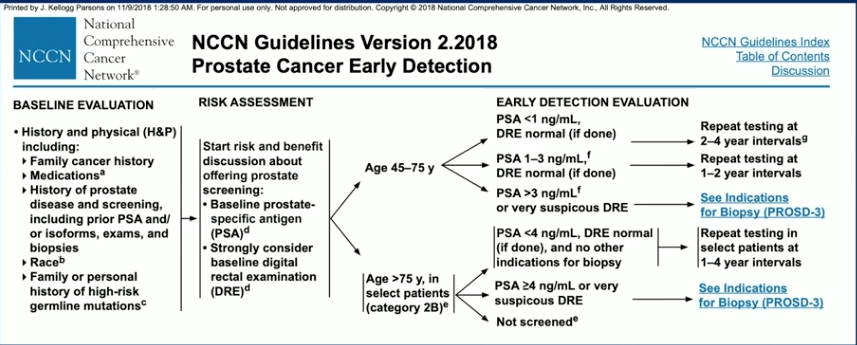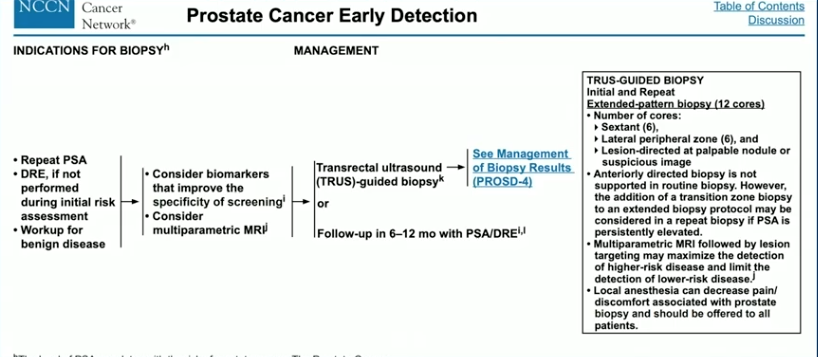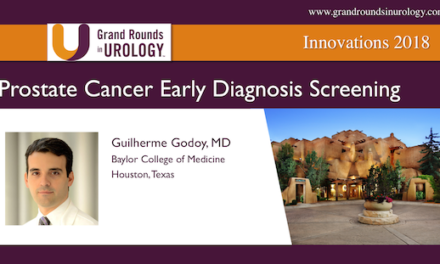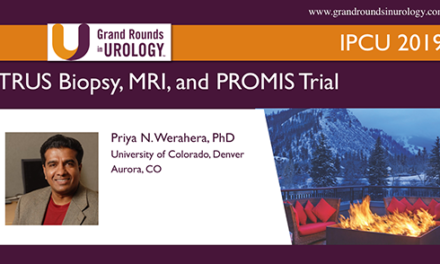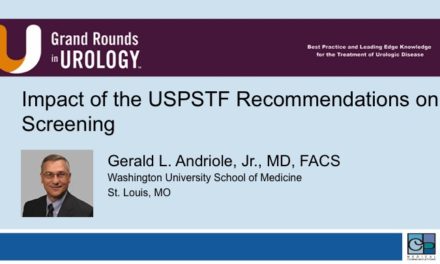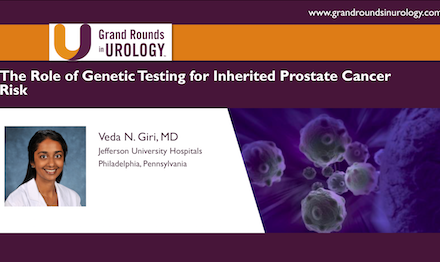J. Kellogg Parsons, MD, MHS, FACS, presented “Prostate Cancer Screening: The NCCN Perspective” during the 27th Annual Perspectives in Urology: Point Counterpoint on November 9, 2018 in Scottsdale, Arizona.
How to cite: Parsons, J. Kellogg. “Prostate Cancer Screening: The NCCN Perspective” November 9, 2018. Accessed Dec 2024. https://dev.grandroundsinurology.com/prostate-cancer-screening-the-nccn-perspective/
Prostate Cancer Screening- The NCCN Perspective – Summary:
J. Kellogg Parsons, MD, discusses the role of the National Comprehensive Cancer Network (NCCN) Prostate Cancer Early Detection guidelines in the PSA screening debate. He then provides commentary on the three algorithms included in the guidelines.
This presentation is part of a Point-Counterpoint debate, coupled with “Prostate Cancer and Early Detection: Should We Follow the NCCN Guidelines?” by Sigrid V. Carlsson, MD, PhD, MPH.
The NCCN Prostate Cancer Early Detection Guidelines: A Middle Ground Between the USPSTF and the AUA
This presentation frames the development of the NCCN Prostate Cancer Early Detection guidelines through the context of the PSA screening debate exacerbated by the United States Preventive Services Task Force (USPSTF). In 2012, the USPSTF released their recommendation against PSA screening. In turn, the American Urological Association (AUA) responded to the USPSTF grading by arguing for screening large populations. The NCCN guidelines provide a practical middle ground in the polarized early detection debate.
The NCCN guidelines undergo annual updates and clearly note changes from prior versions for transparency. The society also makes great efforts to keep the guideline panelists free of conflicts-of-interest. It is essential to maintain the integrity of these guidelines, as Medicare and other payers use them to determine fee schedules.
The Prostate Cancer Early Detection guidelines include three practical, evidence-based algorithms designed for easy use in clinical practice. Each of these algorithms informs a different component of early detection and flows from one to the other in step-by-step order, from PSA screening, to indications for biopsy, and then to interpreting biopsy results.
This presentation reviews these three algorithms and provides commentary on relevant controversies, such as age-stratification for PSA screening and the introduction of MRI into the guidelines.
About Perspectives in Urology: Point Counterpoint
Perspectives in Urology: Point Counterpoint (PCP) is an annual CME-accredited conference devoted to discussing and debating the latest topics in men’s health, general urology, and genitourinary cancers. The conference’s format includes more than didactic lectures. It also includes debates, point-counterpoint discussion panels, and unique case-based presentations. Dr. Parsons presented this lecture during the 27th PCP in 2018. Please visit this page in order to register for future PCP meetings.
ABOUT THE AUTHOR
J. Kellogg Parsons, MD, MHS, is a board-certified urologist who specializes in diagnosing and treating prostate cancer. He is a Professor of Urology at the University of California, San Diego. He also directs clinical trials for the Department of Urology at UC San Diego Health’s Moores Cancer Center.
Dr. Parsons is an expert in nerve-sparing robotic surgery, cryosurgery, and MRI of the prostate, and is internationally recognized for his work in prostate disease. He has repeatedly been named a top doctor in San Diego Magazine’s “Physicians of Exceptional Excellence” annual survey, performed in collaboration with the San Diego County Medical Society. He has also been recognized as one of America’s Best Doctors®.
He has published over 130 scientific research articles, edited four medical textbooks, received multiple research grants, and serves as an editor on three scientific journals. He has won numerous awards for his scientific research, lectures extensively across the US and in Europe and Asia, and serves on several national committees.
Dr. Parsons completed his residency and fellowship training at John Hopkins School of Medicine in Baltimore. He earned his medical degree from the University of Pennsylvania School of Medicine in Philadelphia and holds a Master of Health Science in Clinical Investigation degree from Johns Hopkins Bloomberg School of Public Health.
Dr. Parsons is also the award-winning author of the novels Doing Harm and Under the Knife. He is currently at work on his third book.

